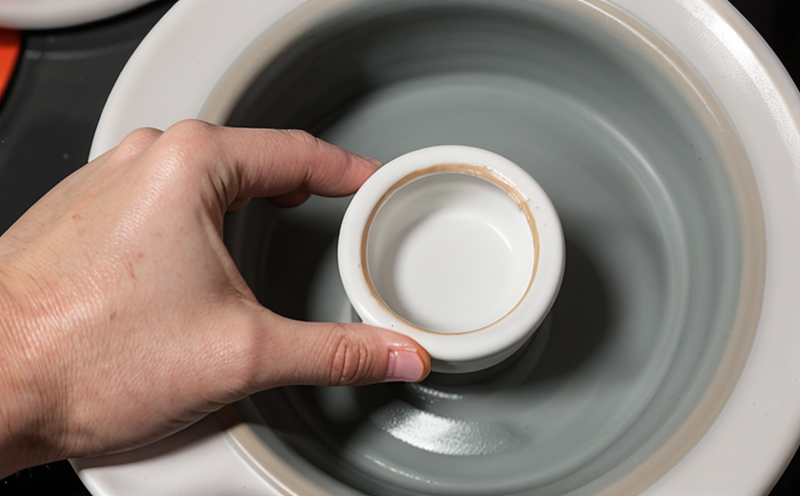ISO 18754 Density Determination of Advanced Ceramic Nanomaterials
The determination of density in advanced ceramic nanomaterials using ISO 18754 is a critical process for ensuring the quality and performance of these materials. This standard provides precise methods to measure the true density, which is essential for understanding the material's properties and its suitability for various applications.
Nanostructured ceramics are characterized by their extremely small grain sizes or particles, which can range from nanometers to micrometers in size. The unique microstructure of these materials contributes significantly to their exceptional mechanical, thermal, and chemical stability. However, this also makes them challenging to test accurately due to the small sample volume and potential irregularities in particle distribution.
The ISO 18754 standard is designed to address these challenges by providing a method that minimizes errors associated with small sample sizes and non-uniform distributions. It specifies the use of advanced techniques such as gas pycnometry, helium pycnometry, or Archimedes' principle adapted for nanomaterials. These methods ensure high precision and accuracy in density determination.
The process involves careful preparation of the samples to maintain their integrity during testing. This includes grinding and sieving to achieve a uniform particle size distribution within specified limits. The sample is then mounted into a suitable holder to facilitate measurement with the chosen technique. Once prepared, the sample undergoes several cycles of compression or expansion, depending on the method used, to determine its true density.
The precision and accuracy of ISO 18754 are critical for ensuring that the nanomaterials meet the required specifications. For instance, in the aerospace sector, where lightweight, high-strength components are essential, accurate density measurement ensures that materials do not compromise structural integrity or performance. In biomedicine, the correct density can influence how well a material integrates into biological systems.
The standard also considers the effects of surface roughness and porosity on the measured density value, providing guidelines to mitigate these factors. The use of advanced techniques like X-ray microtomography (XRM) or scanning electron microscopy (SEM) helps in visualizing and analyzing the internal structure of nanomaterials, complementing the density measurement process.
By adhering to ISO 18754, laboratories can provide reliable and reproducible results that are essential for quality assurance and compliance with international standards. This standard is particularly important for industries where precision in material properties is paramount, such as electronics, pharmaceuticals, and advanced manufacturing.
Why It Matters
The accurate determination of density using ISO 18754 is crucial for several reasons. In the context of nanomaterials, understanding true density helps in optimizing material design and predicting their performance under various conditions.
- Precision in Material Design: The ability to accurately measure density allows engineers and researchers to tailor materials precisely to meet specific application requirements.
- Better Performance Prediction: Knowing the exact density aids in better prediction of how nanomaterials will behave in different environments, such as extreme temperatures or high pressures.
- Enhanced Quality Assurance: Accurate density measurements ensure that materials consistently meet quality standards, reducing the risk of defects and improving product reliability.
In addition to these benefits, accurate density measurement supports advancements in nanotechnology by enabling the development of new materials with enhanced properties. This is particularly important for industries such as aerospace, where weight reduction without compromising strength is a key consideration.
Applied Standards
The ISO 18754 standard builds upon and complements other international standards in the field of nanomaterials testing. It specifically aligns with ASTM E1613, which provides guidelines for the use of helium pycnometry; EN 12409, which covers the principles of gas pycnometry; and ISO 8655, which deals with density determination by Archimedes' principle.
The standard also references other relevant standards such as ASTM E1316 for the measurement of porosity in ceramics, and EN 12409 for the principles of gas pycnometry. By adhering to these standards, laboratories ensure that their testing methods are consistent with international best practices.
The application of ISO 18754 is particularly important for materials that undergo significant changes in density due to their nanostructure. This includes ceramics used in advanced composite materials and those employed in high-temperature applications. The standard provides a robust framework for laboratories to conduct these tests reliably and consistently, thereby maintaining the integrity of the testing process.
Competitive Advantage and Market Impact
- Innovation Leadership: Adherence to ISO 18754 ensures that a laboratory is at the forefront of nanomaterials research, providing clients with cutting-edge testing capabilities.
- Enhanced Client Trust: By offering precise and reliable density determination, laboratories can build strong relationships with their clients, enhancing overall trust and reputation.
- Regulatory Compliance: Ensuring compliance with international standards like ISO 18754 helps companies navigate regulatory environments more effectively, reducing the risk of non-compliance penalties.
- Premium Pricing: The ability to offer precise density measurements can lead to premium pricing strategies, as clients are willing to pay for higher-quality testing services.
The implementation of ISO 18754 not only enhances a laboratory's competitiveness but also drives innovation and excellence in the industry. This standard is particularly valuable for companies involved in high-tech applications where precision and reliability are paramount. By staying current with international standards, laboratories can provide clients with the assurance they need to make informed decisions about their nanomaterials.





